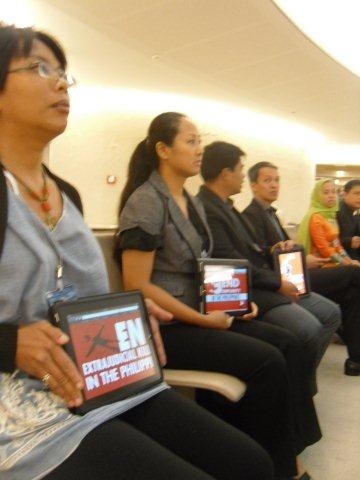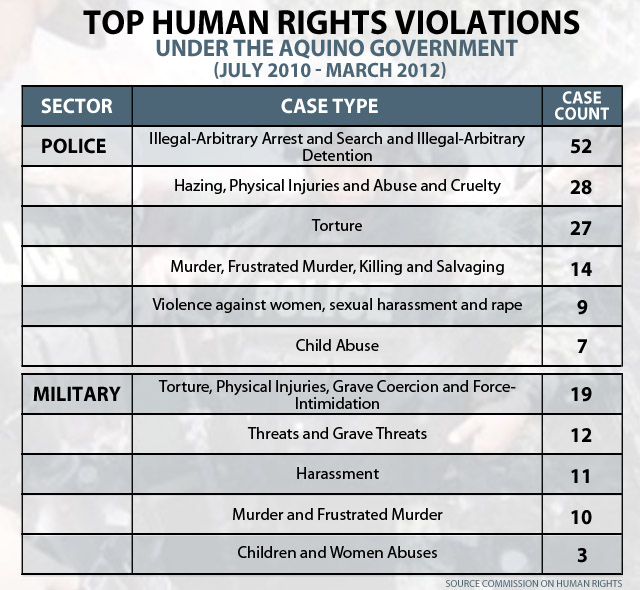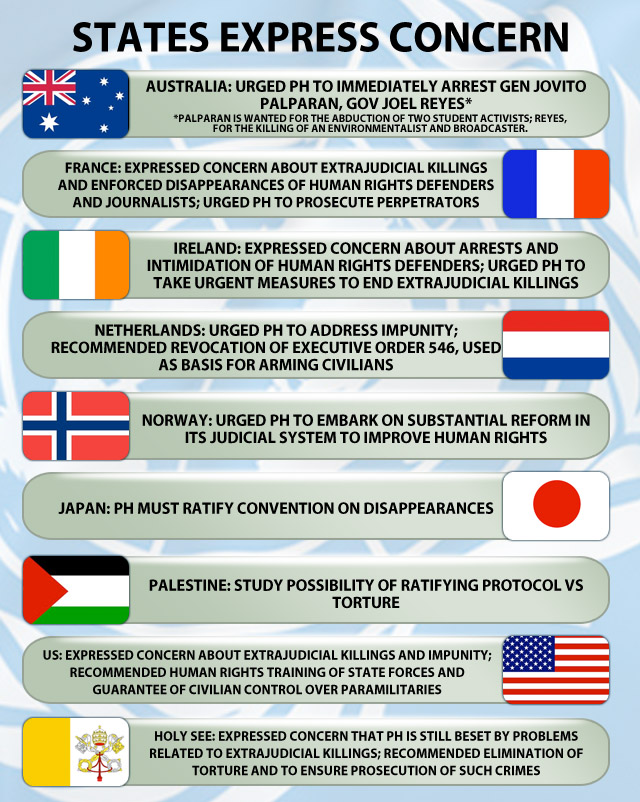SUMMARY
This is AI generated summarization, which may have errors. For context, always refer to the full article.
MANILA, Philippines – Justice Secretary Leila De Lima broke the news of the conviction of Chief Justice Renato Corona at a United Nations human rights review this week, highlighting the verdict as an example of the Aquino government’s adherence to human rights and the rule of law.
“This historic development shows that in the Philippines, no one is above the law as the Aquino administration pursues human rights, good governance, and anti-corruption measures,” De Lima, who led a 29-member delegation, told the Human Rights Council’s Working Group on the Universal Periodic Review (UPR).
De Lima was also former chair of the Commission on Human Rights before she was appointed justice secretary.
But the human rights body which is conducting the second rights review on the Philippines seemed uninterested. What it was most concerned about was the prevalence of extrajudicial killings and impunity in the Philippines.

Muted disinterest
The delegation of the Philippine UPR Watch, a human rights group monitoring the rights review in Geneva, observed that De Lima’s announcement of the verdict “was met with muted disinterest and lethargic reaction at the UN Human Rights Council floor.”
The human rights group reported 76 unprosecuted cases of extrajudicial killings and 9 unresolved cases of enforced disappearances that took place under the Aquino government.
On June 1, the UPR Working Group adopted the Philippine report at its 17th meeting in Geneva, Switzerland, but with 88 recommendations from 64 countries that urged the Aquino government to improve the human rights situation in the country.
“No doubt there is greater interest in the Philippine’s human rights situation by UNHRC members,” Carlos Conde of the Human Rights Watch’s Asia division said.
During the first UPR review in 2008, when international condemnation of the Arroyo administration’s human rights record was widespread, the Philippines received only 17 recommendations from the UNHRC.

Aquino government yet to accept 35 recommendations
Addressing the human rights body before it concluded the Philippine review, Aquino’s deputy executive secretary Teofilo Pilando Jr “deeply appreciated the honest observations and constructive recommendations.”
But Pilando announced the Aquino government is yet to accept 35 of the 88 recommendations.
“We will bring them back with us to Manila for further consultations and review, and with the view of coming up with responses in time for the September (2012) session of the Human Rights Council,” Pilando explained.
Among the recommendations by HRC member countries which the Philippines deferred acceptance of included the following:
(1) Ratification of the International Convention for the Protection of All Persons from Enforced Disappearances (Argentina, Belgium, Brazil, Japan, France, Chile, Spain, Iraq)
(2) Withdrawal of all reservations to Optional Protocol of the Convention against Torture (Slovenia)
(3) Effective investigation and prosecution of attacks against journalists and enactment of a law prohibiting these practices and imposing criminal penalties (Austria)
(4) Dismantling and disarming of the paramilitary forces, militias and armies through the revocation of Executive Order 546 that protects their existence (Netherlands, Spain, Canada)
(5) Adoption and implementation of the law on reparation for victims of violations of human rights during the Marcos dictatorship (Switzerland)
(6) Ratification of ILO Convention No. 189 on domestic workers and enactment of the Domestic Workers’ Bill (Slovakia, Iraq)
(7) Intensification of efforts to combat child labor under the ILO Convention No. 182 as well as No. 138 on Minimum Age for Admission to Employment (Slovakia)
(8) Extension of standing invitation to all special procedures of the Human Rights Council (Uruguay, Madagascar, Austria, Slovenia, Portugal, Latvia)
(9) Establishment of a comprehensive legislation to combat discrimination faced by LGBT (lesbian, gay, bisexual, transgender) people (Argentina)
(10) Providing complete and accurate information and access to all methods of family planning and adoption of the pending Reproductive Health Bill. (Netherlands)

Government implements 8 of the 88 recommendations
The official Philippine delegation accepted 53 of the 88 recommendations made by 64 countries.
The Human Rights Watch Philppines observed that of the 45 recommendations that the Philippines accepted, at least 23 are about impunity, extrajudicial killings, torture and disappearances.
According to Pilando, the Aquino government is already implementing 8 of the recommendations, including the ratification of Rome Statute of the International Criminal Court, the Optional Protocol to the Convention Against Torture, and other treaties relating to human trafficking and the rights of women, children, migrant workers and seafarers.
Pilando also informed the Working Group on the UPR that the Aquino government has started discussions with the independent Commission on Human Rights for the immediate setting up of a tripartite UPR monitoring group, saying that the governemnt wants “broader participation of CSOs to ensure that the Philippines lives up to expectations of the UNHRC.”
Since it was formed in 2008, this is the 2nd time that the UNHRC is reviewing the Philippines through the UPR, the international mechanism that periodically looks into the human rights records of UN’s 192-member countries. – Rappler.com
Click on the links below for related stories:
- [Nation] Mistresses, math and men: Miriam’s latest pick-up lines
- [Thought Leaders] Debt free? by Ronald U. Mendoza
- [Sports] Beckham gets cut from Olympic team
- [Life & Style] Uniqlo to phase out wool from mulesing
- [World] 3 Chinese astronauts return to Earth
Add a comment
How does this make you feel?
There are no comments yet. Add your comment to start the conversation.